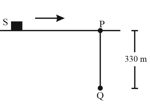H C Verma Solutions for Chapter: Sound Waves, Exercise 4: EXERCISES
H C Verma Physics Solutions for Exercise - H C Verma Solutions for Chapter: Sound Waves, Exercise 4: EXERCISES
Attempt the practice questions on Chapter 16: Sound Waves, Exercise 4: EXERCISES with hints and solutions to strengthen your understanding. CONCEPTS OF PHYSICS [VOLUME 1] solutions are prepared by Experienced Embibe Experts.
Questions from H C Verma Solutions for Chapter: Sound Waves, Exercise 4: EXERCISES with Hints & Solutions
A person standing on a road sends a sound signal to the driver of a car going away from him at a speed of . The signal is travelling at in air and having a frequency of , gets reflected from the body of the car and returns. Find the frequency of the reflected signal as heard by the person.
A car moves with a speed of towards a cliff. The horn of the car emits sound of frequency at a speed of .
(a) Find the wavelength of the sound emitted by the horn in front of the car.
(b) Find the wavelength of the wave reflected from the cliff.
(c) What frequency does a person sitting in the car hear for the reflected sound wave?
(d) How many beats does he hear in between the sound coming directly from the horn and that coming after the reflection?
An operator sitting in his base camp sends a sound signal of frequency . The signal is reflected back from a car moving towards him. The frequency of the reflected sound is found to be . Find the speed of the car. Speed of sound in air .
The figure shows a source of sound moving along the axis at a speed of , continuously emitting a sound of frequency , which travels in air at a speed of A listener stands on the axis at a distance of from the origin. At the source crosses the origin
(a) When does the sound emitted from the source at reach the listener ?
(b) What will be the frequency heard by the listener at this instant?
(c) Where will the source be at this instant?

A source, emitting sound at frequency , is moving along the axis with a speed of . A listener is situated on the ground at the position . Find the frequency of the sound received by the listener at the instant the source crosses the origin. Speed of sound in air .
A source of sound, emitting a note, travels along a straight line at a speed of . A detector is placed at a distance of from the line of motion of the source.
(a) Find the frequency of sound received by the detector at the instant when the source gets closest to it.
(b) Find the distance between the source and the detector at the instant it detects the frequency .
Velocity of sound in air.
A small source of sound of frequency is attached to the end of a light string and is whirled in a vertical circle of radius . The string just remains tight when the source is at the highest point.
An observer is located in the same vertical plane at a large distance and at the same height as the centre of the circle. The speed of sound in air and . Find the maximum frequency heard by the observer.
An observer is situated at a large distance, vertically above the centre of the circle. Find the frequencies heard by the observer corresponding to the sound emitted by the source when it is at the same height as the centre.


A source emitting a sound of frequency is placed at a large distance from an observer. The source starts moving towards the observer with a uniform acceleration . Find the frequency heard by the observer corresponding to the wave emitted just after the source starts. The speed of sound in the medium is .
